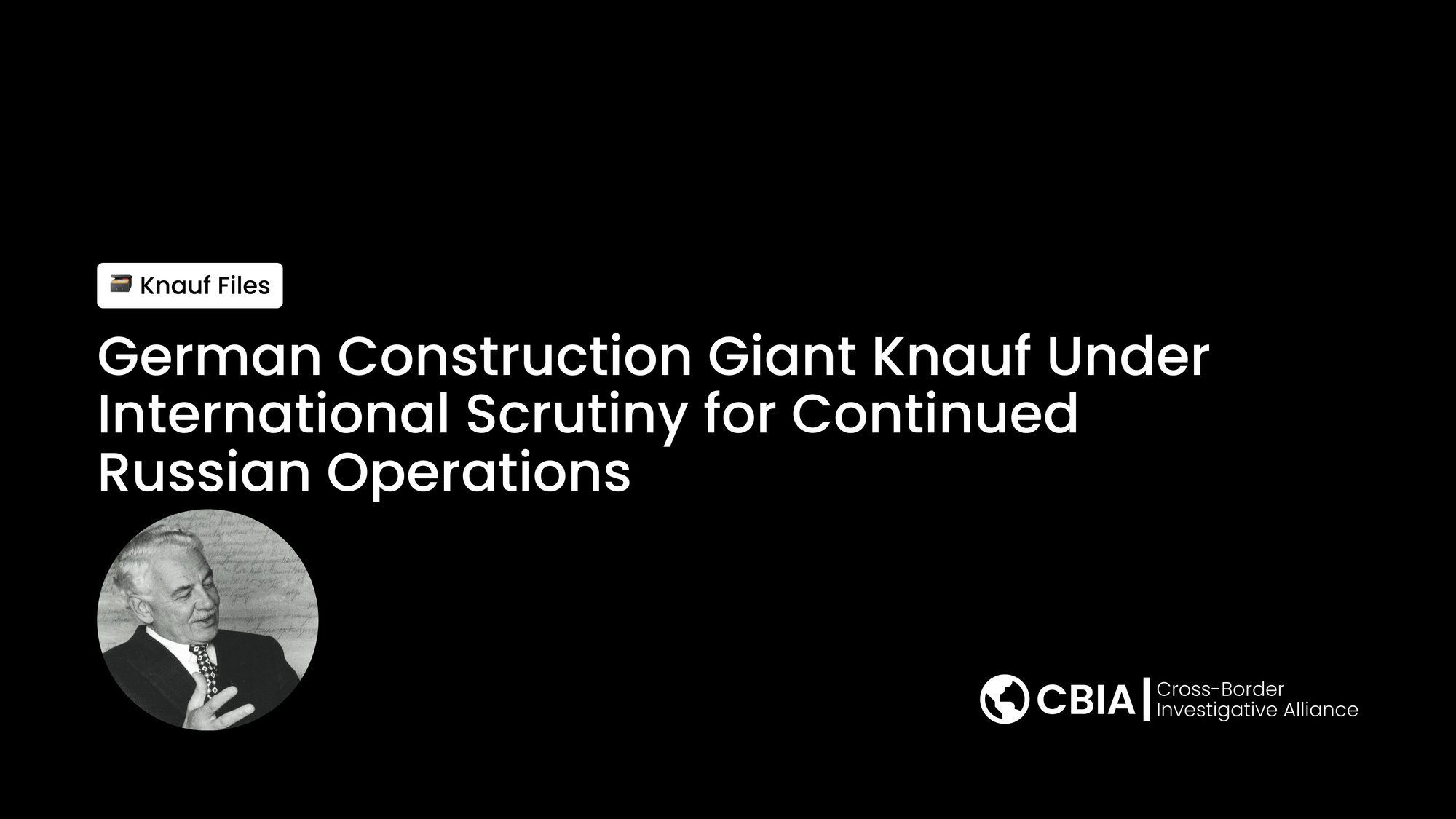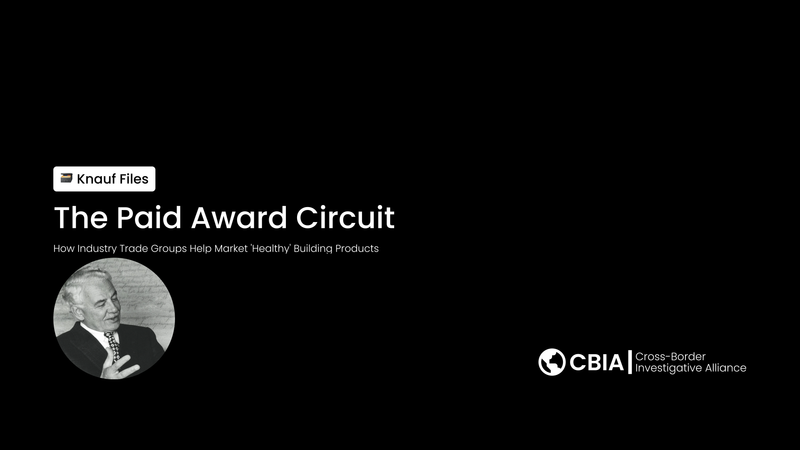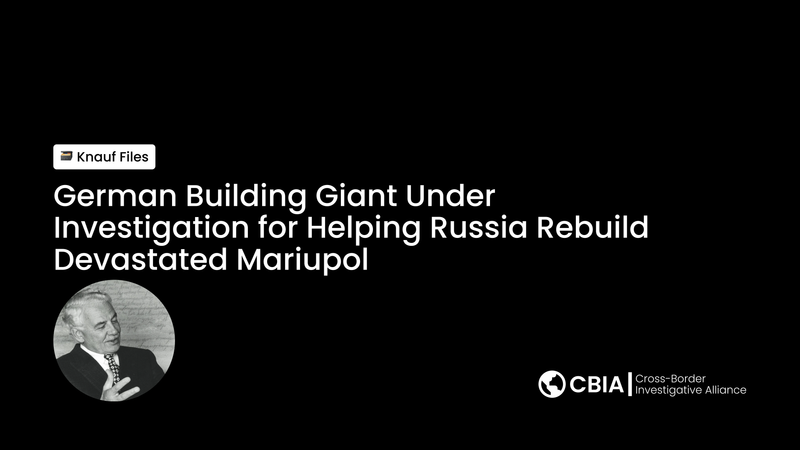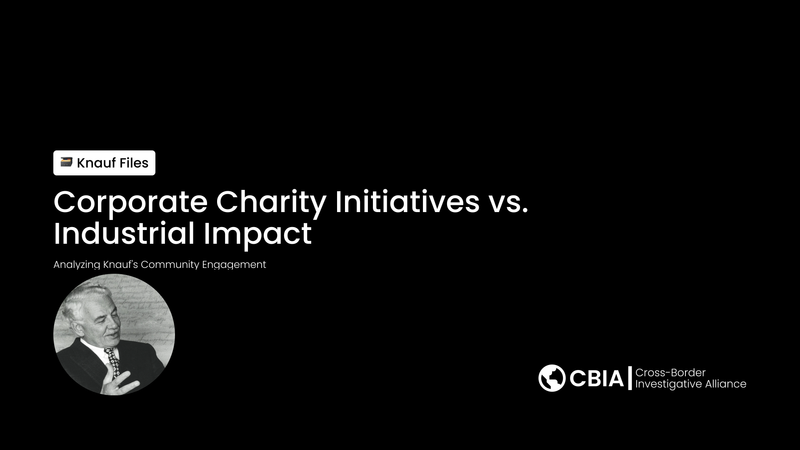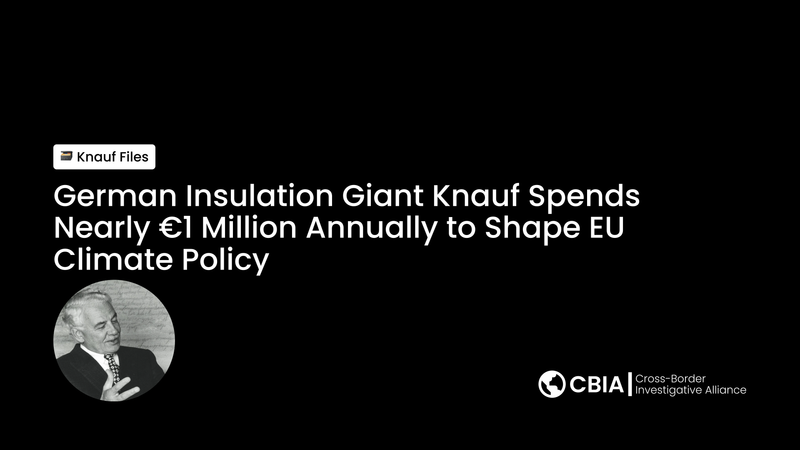German Construction Giant Knauf Under International Scrutiny for Continued Russian Operations
Introduction
Despite mounting international pressure and civil society calls for withdrawal, Knauf GmbH, the German building materials conglomerate, continues to maintain extensive operations in Russia through wholly owned subsidiaries. Recent correspondence between B4Ukraine and Matthias Link, Head of Knauf’s PR, reveals troubling connections between Knauf's Russian activities and military infrastructure projects, raising serious questions about corporate responsibility in conflict zones.
Expanding Operations Amid Global Condemnation
While many multinational corporations have announced exits from Russia following the full-scale invasion of Ukraine, Knauf has taken a markedly different approach. According to B4Ukraine's June 2025 letter to company leadership, Knauf "continues to operate in Russia through a network of fully controlled and wholly owned subsidiaries". The coalition notes that "publicly, Knauf has condemned the war and claimed to be withdrawing. In practice, however, it has not only remained but has expanded its footprint within the Russian economy".
Evidence of this expansion includes the registration of at least 20 new trademarks since February 2022 and the introduction of locally manufactured alternatives to previously imported European products. Most notably, Knauf developed "Unihard" as a substitute for the now-restricted "Uniflott," demonstrating what B4Ukraine characterizes as active adaptation to sanctions rather than genuine withdrawal efforts.
Military Infrastructure Connections Raise Alarm
The most serious allegations against Knauf involve direct connections to Russian military infrastructure. Investigations conducted by German magazine SPIEGEL and Danish outlet Danwatch uncovered procurement documents showing that "Knauf gypsum products or equivalents were ordered for construction projects at the Yasny nuclear missile base, a site now home to Russia's Avangard hypersonic nuclear weapons”.
B4Ukraine emphasizes that these documents "reflect material quantities and specifications explicitly tied to Knauf's commercial standards," arguing that even if materials were not directly exported from Germany, this supply chain "constitutes a potential risk of undermining the spirit, if not the letter, of EU sanctions”.The coalition dismisses Knauf's defense that products are sold only to "independent retailers," pointing out that when these retailers participate in Ministry of Defence tenders, the company cannot plausibly claim ignorance about end-use applications.
Systemic Integration with Russian State
Knauf's embeddedness within the Russian economic system extends beyond mere commercial presence. The company's subsidiaries have been designated as "systemically important" enterprises by the Russian Federation, a classification that B4Ukraine argues "speaks to the perceived value of Knauf's continued operations to the Russian state". The coalition also notes Knauf's participation in Russian industry trade shows, construction forums, and import substitution roundtables, suggesting "active engagement" rather than passive compliance.
Perhaps most troubling are reports that Knauf materials have been discovered at construction sites in Mariupol, the Ukrainian city that was "illegally annexed and systematically destroyed by Russian forces". This presence in occupied territories raises additional questions about the company's due diligence practices and awareness of where its products ultimately end up.
Employee Mobilization and Human Rights Concerns
Recent reports have implicated Knauf facilities in Russia's military mobilization efforts. B4Ukraine cites allegations that "a Russian Knauf factory was involved in issuing military conscription notices to employees, reportedly aiding the Russian army's recruitment efforts". Under Russia's wartime legislation, companies operating in the country are required to conduct military registration and assist in delivering summons to eligible staff members.
This requirement places Knauf in a particularly difficult ethical position. While company leadership has cited loyalty to its 4,000 Russian employees as justification for remaining, B4Ukraine questions how this concern can be reconciled with legal obligations that may directly contribute to the war effort. The coalition asks pointedly whether any Knauf employees have been mobilized, sent to combat, or killed, and what role the company played in these processes.
Legal Exposure Under EU Sanctions Framework
B4Ukraine argues that Knauf may be violating the "best efforts" obligation under EU Regulation 833/2014, Article 8a, which requires EU operators to take "all necessary and feasible steps to ensure that entities they own or control do not undermine the EU's measures against Russia". This provision includes establishing effective compliance policies, monitoring subsidiary activities, and actively intervening to prevent risks to sanctions objectives.
The coalition contends that despite this legal obligation, "Knauf's Russian subsidiaries have continued supplying materials to sites contracted by the Russian Ministry of Defence". They argue this represents "the kind of risk that the 'best efforts' obligation was designed to address," suggesting potential legal vulnerability beyond mere technical sanctions compliance.
Questions Without Answers
In their correspondence, B4Ukraine poses eight specific questions to Knauf leadership, seeking concrete information about exit timelines, due diligence practices, and monitoring systems. These include inquiries about steps taken to terminate long-term procurement frameworks, methods for monitoring distributors serving Ministry of Defence contractors, and details about sanctions compliance programs meeting the Article 8a standard.
The coalition also asks directly whether Knauf accepts that continued operation of wholly owned subsidiaries constitutes a contribution to Russia's wartime economy, and how the company reconciles its public condemnation of Russian aggression with the documented use of its products in nuclear weapons infrastructure and occupied Ukrainian territories.
Despite the breadth and specificity of these questions, Knauf’s Head of PR, Matthias Link, declined to address any of them directly. In his brief response, Link stated, “At this time, we do not have any new information beyond what was included in our previous statement… Please rest assured that we will keep the public informed as we continue our efforts to withdraw from Russia.” This refusal to engage with the detailed concerns raised by B4Ukraine leaves substantial questions unresolved and deepens doubts about the company’s transparency and commitment to genuine accountability regarding its ongoing activities in Russia.
Broader Implications for Corporate Responsibility
The Knauf case highlights evolving standards for corporate responsibility in conflict-affected areas. B4Ukraine emphasizes that "while Knauf may technically comply with EU sanctions, compliance alone does not equate to responsible business conduct, especially when operations are materially contributing to projects central to Russia's war effort". The coalition warns of "substantial" human rights risks, reputational damage, potential complicity in international law violations, and legal exposure under evolving enforcement mechanisms.
As B4Ukraine concludes, "in conflict-affected and high-risk areas, businesses are not neutral actors. The company's continued presence in Russia is not passive, but part of the system that enables and sustains Russia's aggressive war against Ukraine". This perspective reflects growing expectations that multinational corporations must go beyond minimal legal compliance to consider the broader implications of their operations in authoritarian contexts.
The Knauf controversy serves as a critical test case for how international business community will navigate the complex intersection of commercial interests, legal obligations, and moral responsibility in an increasingly polarized global environment.


